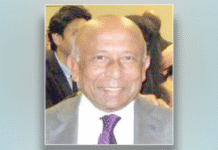Amendments to Bangladesh labour law make some improvements, but still fall far short of protecting worker’s rights and meeting international standards, says Human Rights Watch (HRW).
Bangladesh’s donors and international investors should press the government to make further amendments to the law to fully ensure workers’ rights to form unions, bargain collectively, and participate in workplace decisions on safety, says the New York-based global rights watchdog.
It says under domestic and international pressureBangladeshparliament on July 15, 2013 brought the changes to the Labour Act. The impetus for a reformed labour rights law sprang from the collapse of the Rana Plaza building in greater Dhaka in April, which killed over 1,100 garment factory workers.
The Rana Plaza tragedy followed many other workplace tragedies that resulted in large loss of life.
“The Bangladesh government desperately wants to move the spotlight away from the Rana Plaza disaster, so it’s not surprising it is now trying to show that it belatedly cares about workers’ rights,” said Phil Robertson, HRW’s deputy Asia director.
He says, “This would be good news if the new law fully met international standards, but the sad reality is that the government has consciously limited basic workers’ rights while exposing workers to continued risks and exploitation.”
Bangladesh has ratified most of the core International Labour Organization labor standards, including Convention No. 87 on freedom of association and Convention No. 98 on the right to organise and bargain collectively. However, important sections of the Labour Act still do not meet those standards.
The new amendments deal with only some problematic provisions of the existing law, while leaving others untouched. For example:
- At least 30 percent of the workers in an establishment, which can comprise many factories, would still have to join a union for the government to register it.
- Unions will be allowed to select their leaders only from workers at the establishment. This will enable employers to force out union leaders by firing them for an ostensibly non-union-related reason, a common practice globally. Workers in export processing zones, which cover a large percentage of Bangladesh’s work force, would remain legally unable to form trade unions.
- The amended law adds more sectors, including non-profit education and training facilities, as well as “hospitals, clinics and diagnostic centers,” to a lengthy list of types of employment in which workers are not permitted to form unions.
- The right to strike will remain burdened by a cumbersome bureaucratic process and the requirement that two-thirds of the union’s membership would have to vote for a strike, a small improvement over the previous requirement of three-quarters of the membership.
- The government will be able to stop a strike if it decides it would cause “serious hardship to the community” or is “prejudicial to the national interest,” terms that are not defined but can easily be misused.
The revised Labour Act could also have a major negative impact on unions by expanding government control over unions’ access to foreign funding. The law would require prior approval from the Labor and Employment Ministry before either trade unions or employer organizations could receive “technical, technological, health & safety and financial support” from international sources.
A major test of the government’s commitment will be implementation of provisions that protect worker safety and the rights to organize and collective bargaining. The ruling Awami League is backed by factory owners and has many members of parliament who own factories.
The government has failed to develop specific regulatory rules to carry out various provisions of the previous law, adopted in 2006, raising concerns about its willingness to implement new measures, the HRW report says.
Source: UNBConnect










